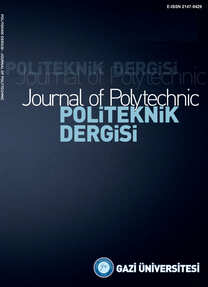Pnömatik Motor ile Tahrik Edilen DA Generatörü Çıkış Geriliminin Kontrolü
Dünyadaki enerji talebinin büyük bir kısmı zamanla azalmakta olan ve çevreyi kirleten petrol gibi enerji kaynaklarından karşılanmaktadır. Bundan dolayı güneş, rüzgâr ve dalga enerjisi gibi temiz ve güvenilir enerji kaynaklarına olan ihtiyaç gittikçe önem kazanmaktadır. Ancak, bu alternatif enerji kaynaklarından üretilen enerjinin depolanmasında önemli problemler ortaya çıkmaktadır. Bu çalışmada, enerjinin hızlı ve etkin bir şekilde depolanabilmesi için basınçlı hava kullanılarak elektrik enerjisi üretebilmek amacıyla bir sistem tasarlanmıştır. Tasarlanan sistemde, generatör tahriki için basınçlı hava ile çalışan paletli tip bir pnömatik motor(PM) kullanılmıştır. PM’nin hızını ve torkunu ayarlamak için sisteme bir hız ayar valfi eklenmiş ve bu valf bir Doğru Akım motoruyla denetlenmiştir. Yapılan uygulamalar sonucunda, depolanan basınçlı hava enerjisi elektrik enerjisine dönüştürülmüş ve yüklerin talep ettiği ölçüde enerji harcanmıştır. Böylece depo edilen enerji çok daha verimli bir biçimde kullanılmaktadır.
Output Voltage Control of DC Generator Driven by Pneumatic Motor
A large part of the World's energy demands are provided from energy sources such as petrol which is decreasing gradually and causing environmental pollution. Therefore, the requirement for clean and reliable energy like sun, wind and wave is more important recently. On the other hand, important problems are occured in storing of the energy produced from these alternative energy sources. In this study, a system was devised to generate electric energy using compressed air for storing of the energy more quickly and effectively. In the designed system a pneumatic motor(PM), working with compressed air, was used to drive the generator. In order to control the speed and the torque of the PM, a speed control valve was added to the system and the valve is controlled by a DC motor. As a result of the applications, the stored compressed air was converted into the electrical energy and the energy was consumed based on the extent of loads demand. In this way, the stored energy can be used more efficiently
